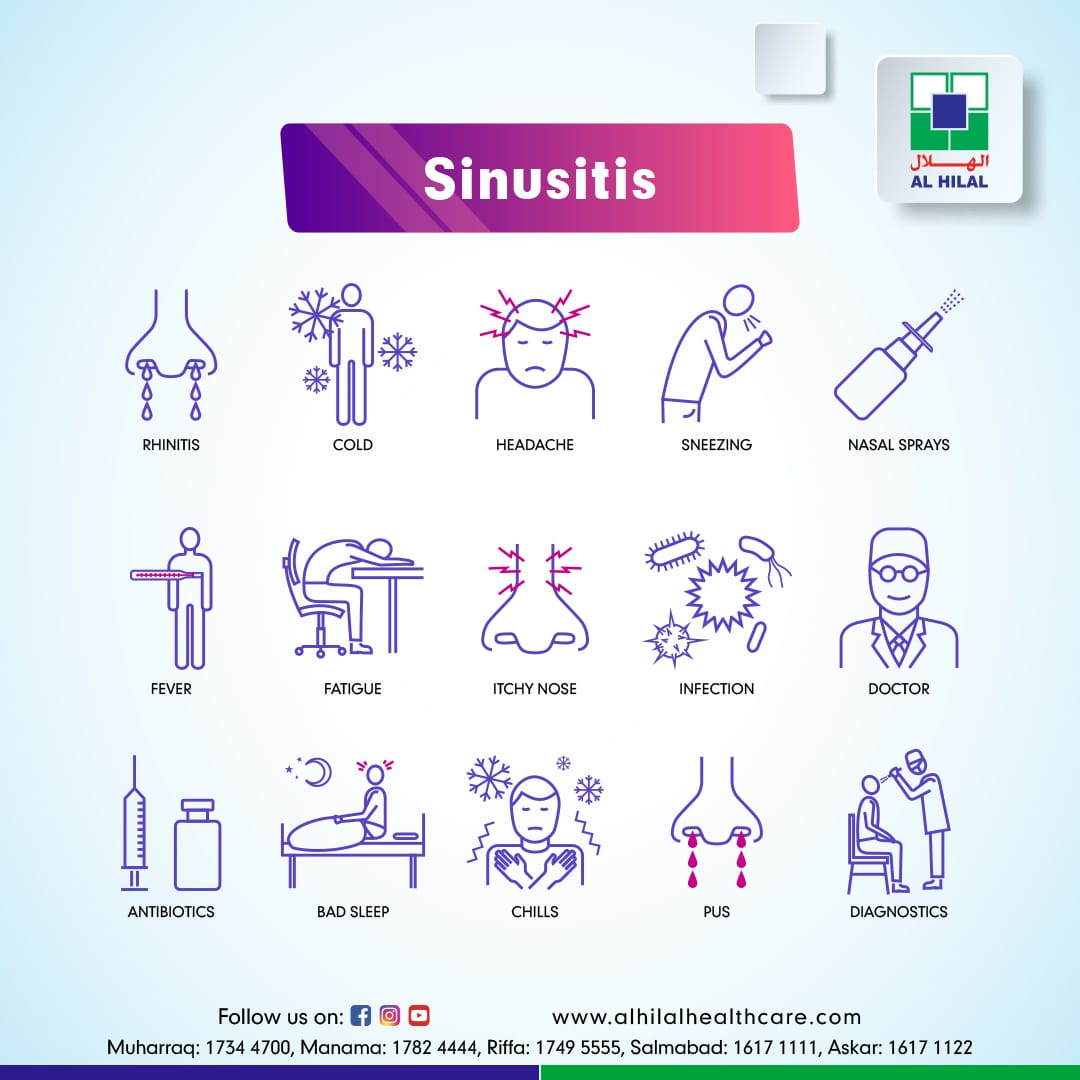Sinusitis (sinus infection) is a swelling or inflammation of the sinuses’ tissue lining. In other words, it is the swelling of the sinuses, usually caused by an infection. The sinuses are four paired cavities in the head. Narrow channels connect them. The sinuses create thin mucus that drains out of the track of the nose. This drainage aids keep the nose hygienic and free of bacteria. However, generally filled with air, the sinuses can get clogged and filled with fluid. When that occurs, bacteria can develop and cause an infection.

The main sinus infection symptoms are discolored nasal discharge, nasal obstruction, and facial pain or pressure prevailing for seven days or more.
FEW FACTS ON SINUSITIS:
Have a look at some of the facts related to sinusitis:
- Usually, the sinuses are unclogged except for a thin layer of mucus.
- When the sinuses become swollen and inflamed, they can no longer drain mucus, resulting in a build-up.
- The majority of cases of sinusitis is viral and requires symptomatic comfort, not antibiotics.
- Only about 0.5 to 2.0 percent of sinus infection episodes are bacterial.
- Antibiotics are the primary form of medical remedy for acute bacterial sinusitis.
TYPES OF SINUSITIS:
The significant types of sinusitis are as follows:
- Acute Bacterial Sinusitis: This type refers to a sudden beginning of cold symptoms such as stuffy nose, runny nose, and facial pain that doesn’t get cured even after ten days, or symptoms that seem to improve but then come back are more harmful than the initial signs. It reacts well to decongestants and antibiotics.
- Chronic Sinusitis: This is a condition defined by nasal drainage, congestion, facial pain, and decreased sense of smell for at least 12 weeks.
- Subacute Sinusitis: This is a condition when the signs last four to twelve weeks.
- Recurrent Acute Sinusitis: This is when the signs and symptoms return four or more times in a year and last for less than two weeks.
SYMPTOMS OF SINUSITIS:
- Nasal discharge, which is thick yellow or green.
- Stuffy nose.
- A reduced sense of smell.
- A sinus headache.
- Sore throat.
- Post nasal drip.
- Facial pressure, particularly around the eyes, nose, and forehead,
- Pain in your ears or teeth.
- Cough.
- Tiredness.
- Halitosis (Bad Breath).
- Fever
Symptoms of sinusitis in young children may also include difficulty breathing, irritability, and breathing through their mouth.
CAUSES OF SINUSITIS:
Sinusitis can be caused by a bacteria, virus, or fungus that blocks and swells the sinuses. A few specific causes include:
- The common cold.
- Polyps (growths).
- Nasal and seasonal allergies, including mold allergies.
- A deviated septum.
- A fragile immune system from medications or illness.
For young children and infants, spending time in daycares, drinking bottles while lying down, or using pacifiers could increase the chances of getting sinusitis.
For adults, smoking raises the risk of sinus infections. So if you smoke, you should quit. Smoking is dangerous to you and the people around you.
DIAGNOSIS OF SINUSITIS:
Your doctor will ask many inquiries to create a detailed medical history and discover your symptoms. They will also do a physical inspection. During the examination, your doctor will review your nose, ears, and throat for any draining, swelling, or blockage. An instrument called an endoscope might be used to look inside the nose. If you need an imaging exam, your provider would order a CT Scan.
TREATMENT OF SINUSITIS:
The important thing is to understand the actual cause. For example, if your sinusitis is because of allergies, then decongestants alone will likely not help much.
If you have symptoms persist for more than ten days, consult with your doctor. You may precisely determine what’s causing the issue with a good examination.
The soundest sinusitis treatment is usually a mixture of medication and self-care methods.
MEDICINES:
- Antibiotics: If your doctor believes a bacterial infection is to condemn, they may suggest antibiotics. For acute sinusitis, you usually take them for 10-14 days. For chronic sinusitis, it might be a little longer. Antibioticsonly aid with bacterial infections. They won’t assist if viruses or other problems cause your sinusitis.
- Painkillers: Many sinusitis patients take over-the-counter pain medicines to relieve pain. Observe the instructions on the label, and don’t take them for more than ten days. Then, check with your doctor to see which is right for you.
- Decongestants: These medicines reduce the amount of mucus in the sinuses. Some are available as pills. Others are nasal sprays. If you use decongestant nasal sprays for more than three days, they may make you more congested. Following the instructions on the label is essential.
- Allergy medicines: Many cases of sinusitis are because by uncontrolled allergies. If you have never been diagnosed with allergies, it might be better to do some allergy testing to see if you have them. If you do, medication and avoiding your triggers will help. Another alternative is to get allergy shots, a long-term remedy that slowly makes you less exposed to the things that set off your signs.
- Steroids: In a few cases, your doctor may prescribe inhaled steroids to pull down the swelling in the sinus membranes. In addition, you may need to take steroids orally for challenging cases of chronic sinusitis.
HOME REMEDIES FOR SINUSITIS:
While medicines can support, many cases of sinusitis go away on their own without any medication. However, if you often get the illness, many of these approaches will help you prevent it.
- Humidify:Use a humidifier in rooms where you spend most of the time. Then, observe the instructions for regular cleaning.
- Breathe in steam vapors:You can run the shower, sit in the bathroom, or breathe in steam from a bowl of warm water. The steam vapors relieve swollen and congested nasal passages.
- Use warm heat: Put a wet, warm towel on your face. It can lift off some of the pressure.
- Use a nasal saline solution: While they do not contain medicine, they can assist keep your nasal passages moist.
- Flush out sinuses:Nasal irrigation with salt water can clear mucus and moisten your sinuses. You can use bulb neti pots or syringes, for example. Use sterile, distilled, or boiled water to make up the irrigation solution. Wash the device after each use and let it air dry.
- Drink lots of fluids.They will support thin the mucus, lowering the sinuses’ blockage. Quit alcohol, which makes the swelling even worse.
- Rest: When you’ve got a sinus infection, get plenty of sleep and give your body a chance to recover.
Home treatments may do the trick for some people. But call your doctor if you’ve had sinus signs for over a few days or if they are terrible. The sooner you start the proper treatment, the sooner you will feel better again.
TREATMENT OF SINUSITIS IN BAHRAIN:
Al Hilal Hospital is Bahrain’s largest and fastest-growing chain of private healthcare providers, with five branches. Al Hilal Healthcare Group is committed to providing high-quality healthcare services at an affordable price to the people of Bahrain through a combination of superior medical technology and excellent clinical services. Its vision is to be the largest healthcare service provider in the region by catering to the needy at the most affordable rates.
The Department of ENT in Al Hilal has provided comprehensive and quality healthcare for patients for an extended period. As a result, all the facilities for treating sinusitis are available in Al Hilal at an affordable cost.
SPECIALIST IN TREATING SINUSITIS IN BAHRAIN:
Al Hilal Healthcare group is equipped with several well-qualified and experienced ENT physicians who are specialists in treating sinusitis and ear, nose, and throat illnesses.


